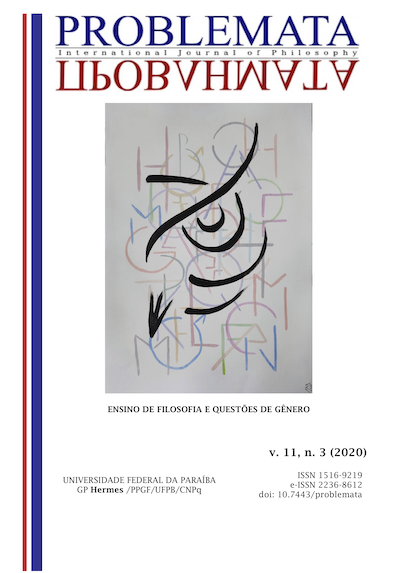INVISIBILIA:
AN EXPERIENCE REPORT ABOUT A ALTERNATIVE MATERIAL FOR PHILOSOSPHY TEACHING
DOI:
https://doi.org/10.7443/problemata.v11i3.53961Keywords:
Women, Philosophy teaching, Games, Educacional productAbstract
The smallest number of women philosophers in the textbooks offered by National Program of Textbook could lead students from all over the country to a erroneous conclusion of the women thinkers absence throughout Philosophy history, or at least that they are limited to the contemporary discussions. In order to supply this gap in the high school formation, a educational game called “Invisibilia: looking for the women in philosophy” was developed. The game, as a result of colective product between students and teacher, has aimed to present different women philosophers that help the participants to remove, in cooperative way, the intolerants from the “democratic game” and to conclude missions about the struggles of gender equality in a world of inequality or with precarious inclusion, enabling a common space of interaction and reflexion. The game was produced in 2018 and is part of educational products collection at CEFET/RJ, it is played in other spaces of formation and its material is available for free in a website. This paper intends to do an experience report on the elaboration and reception of the game "Invisibilia", in view of as the problematization about the women philosophers absence in the textsbooks – from a specific frame – as an investigation about the genre estrutural inequality – from a wider philosophical approach. In fact, these levels (specific and wide) are always on the horizon of any educational production with a genre outline and they should not be left on this investigation.
Downloads
References
BRASIL, Lei ordinária 11.684 de 02 de junho de 2008. Altera o art. 36, de agosto de 2006, altera o artigo 10 da Resolução CNE/CEB nº 3/98, que institui as Diretrizes Curriculares Nacionais para o Ensino Médio. Diário Oficial da União. Brasília, 2006, seção 1, p. 15.
BRASIL. Lei nº 13.415, de 16 de fevereiro de 2017a. Altera as Leis nº 9.394, de 20 de dezembro de 1996, que estabelece as diretrizes e bases da educação nacional, e nº 11.494, de 20 de junho 2007, que regulamenta o Fundo de Manutenção e Desenvolvimento da Educação Básica e de Valorização dos Profissionais da Educação, a Consolidação das Leis do Trabalho CLT, aprovada pelo Decreto-Lei no 5.452, de 1 de maio de 1943, e o Decreto-Lei nº 236, de 28 de fevereiro de 1967; revoga a Lei nº 11.161, de 5 de agosto de 2005; e institui a Política de Fomento à Implementação de Escolas de Ensino Médio em Tempo Integral. Portal da Legislação. Brasília, 2017a. Disponível em <http://www.planalto.gov.br/ccivil_03/_Ato2015-2018/2017/Lei/L13415.htm>. Acesso em 25 de fevereiro de 2020.
BRASIL, Ministério da Educação. PNLD 2018: Filosofia – guia de livros didáticos – Ensino Médio. Brasília: Ministério da Educação: Secretaria de Educação Básica, 2017b. Disponível em <https://www.fnde.gov.br/pnld-2018/index.html>. Acesso em 20 de fevereiro de 2020.
COLLINS, Patricia Hill. “Aprendendo com a outsider within: a significação sociológica do feminismo negro”. Trad. Juliana de Castro Galvão. In: Revista Sociedade e Estado, v. 31, n. 1, 2016. pp. 99-127.
GABRIEL, Alice de Barros. “Gênero nas aulas de Filosofia: Análise de um livro didático”. In: Kínesis, v. XI, n. 28, julho de 2019, p. 1-14.
GLEICHAUF, Ingebord. Las mujeres filósofas en la historia: desde la antgüedad hasta el siglo XXI. Trad. Kátia Pago Cabanes. Barcelona: Icaria; LaDesclosa, 2010.
LARROSA, Jorge. Tremores: Escritos sobre experiência. Trad. Cristina Antunes e João Wanderley Geraldi. Belo Horizonte: Autêntica, 2016.
MENZEL, Michael. As lendas de Andor. Devir Brasil, 2012.
NUSSBAUM, Martha. “Objectification”. In: Philosophy and Public Affairs v. 24, n.4, 1995, pp. 256-57.
PACHECO, Juliana. (Org.). Filósofas: a presença das mulheres na filosofia. Porto Alegre: Editora Fi, 2016.
PAPADAKI, Lina. “What is is objectification?”. In: Journal of Moral Philosophy. v. 7, n. 1, 2010. pp. 16-36.
______. "Feminist Perspectives on Objectification". In: Edward N. Zalta (ed.). The Stanford Encyclopedia of Philosophy, Summer of 2020. Disponível em <https://plato.stanford.edu/archives/sum2020/entries/feminism-objectification/>. Acesso: 12 de julho de 2020.
PROJETOS: CONHEÇA OS TRABALHOS BRASILEIROS SOBRE FILOSOFIA E MULHERES. Rede Brasileira de Mulheres Filósofas. 2019. Disponível em < https://www.filosofas.org/projetos>. Acesso em 02 de julho de 2020.
WUENSCH, Ana Míriam. “Acerca da existência de pensadoras no Brasil e na América Latina”, Problemata Revista Internacional de Filosofia. v. 6, n. 1, 2015. pp. 113-150.
YOUNG, Iris Marion. Justice and the politics of difference. Princeton, New Jersey: Princeton University Press, 1990.
______. Inclusion and democracy. Oxford: Oxford University Press, 2000.
Downloads
Published
Issue
Section
License
Authors who publish with this journal agree to the following terms:
- Authors retain copyright and grant the journal right of first publication with the work simultaneously licensed under a Creative Commons Attribution License that allows others to share the work with an acknowledgement of the work's authorship and initial publication in this journal.
- Authors are able to enter into separate, additional contractual arrangements for the non-exclusive distribution of the journal's published version of the work (e.g., post it to an institutional repository or publish it in a book), with an acknowledgement of its initial publication in this journal.
-
- Authors are permitted and encouraged to post their work online (e.g., in institutional repositories or on their website) prior to and during the submission process, as it can lead to productive exchanges, as well as earlier and greater citation of published work (See The Effect of Open Access).





